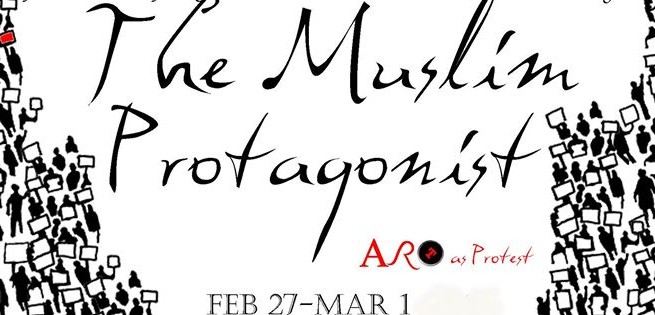[title maintitle=”” subtitle=”Footnotes on science fiction, politics & Muslim protagonists”]
I remember the first, bonafide adult books I read: Ender’s Game by Orson Scott Card and I, Robot by Isaac Asimov. They changed me irreparably and began a lifelong addiction to science fiction. Kurt Vonnegut helped me understand the trauma of war and apocalypse. Octavia Butler showed me the racial intersections between history, present, and future. Frank Herbert’s Dune illustrated for me the intricate politics of empire and its discontents.
A friend of mine recently responded to my praise of science fiction by suggesting I read academia instead, because history books and biographies, like science fiction, directly confront similar themes of politics and culture. But science fiction—and any form of storytelling—has the power to involve readers in an experience. It doesn’t deliver theses or propositions. It accesses the soul.
Science fiction provided me with a means of understanding the rapidly changing world around me, of what it meant to be a Dominican Pakistani Muslim in post-9/11 America. Science fiction stories often revolve around the subject of social change, but it wasn’t this alone which drew me. The genre itself is treated by both mainstream readers and the literary elite in the same way Muslim and other marginalized narratives are treated: Improperly read, rarely taught, severely misunderstood, so diverse as to render them incapable of proper definition.
The genre embraced the new and the different. It lived on the outskirts of the Western canon, shunned The New York Times’ Bestseller List, and chided literary accolades. If it hadn’t been for my love of the science fiction, I would have never mustered the courage to condemn Othello or Heart of Darkness when the rest of class couched itself behind the language of “colorblind critique.”
And then I read a story by Isaac Asimov, the man who had sparked my passion for science fiction, social justice, and storytelling. This story about a man who steals a piece of the holy stone in Mecca, left me disturbed, and not because of its premise, but rather because of the highly Orientalist manner with which Asimov depicted his Arab villain: swarthy, mysterious and dangerous.
I felt betrayed by a close friend. How could Asimov do this to me?
I was soon let down by the recent pro-war, far-right sentiment of Orson Scott Card, another author responsible for my passion for literature and social justice. Card portrayed his Muslim protagonist, Alai, in the sequels to Ender’s Game as the easily seduced and manipulated Caliph of the revived Muslim League.
No matter how deeply Asimov or Card wrote about and instigated social change, pieces of their stories left me dissatisfied. There is something irreplaceable, I realized, about choosing to write my own story. If I have a problem with existing narratives, I should write the ones I want to read. There is something to be said for Muslims writing about Muslims, Latinos about Latinos, and South Asians about South Asians. These marginalized communities in America are hungry to arrive in full form in the pages of that great American novel. We want the richness of these protagonists to be debated in classrooms, distributed in our libraries, and lived in our everyday lives.
At Columbia University, I sought to change these narratives proactively, co-founding the annual The Muslim Protagonist symposium with Barnard alumna Mirzya Syed. The Muslim Protagonist aims to nurture an environment rooted in our faith and its deep ties to social justice, providing space for a multitude of voices—Muslims and their allies, both established and up-and-coming, mainstream and controversial. We want you to think, but also to be moved. We want you to brood, but also to laugh. We want to raise your spirits, to inspire you to “write your own story,” but we also want to shake your foundations ever so slightly. We want a community that is intellectual and spiritual, political and faithful, critical and affectionate, rebellious and proactive.
Regardless of whether stories are speculative or not, they seek to access the political. Ascribing “the political” to literature often raises eyebrows, a fear of didactic storytelling. This can’t be further from the truth. The struggles our communities face today in the wake of the Chapel Hill tragedy, NYPD surveillance, and the cultural ubiquity of Islamophobia are both personal and political.
A mentor once told my writing workshop that we could choose to become writers for three reasons: For fame, for profit, or for passion. There is nothing wrong with prioritizing any of these reasons, he advised. The real danger, he said, is when you confuse them. I like to believe there’s a fourth option: For change—to alter readers’ worldviews, to make them think and feel in ways they’ve never thought or felt before.
I like to think that is why I write.
Haris A. Durrani (@hdernity) is Co-Founder of The Muslim Protagonist Symposium at Columbia University, where he is an Egleston Scholar. His published fiction, memoirs, and essays explore personal narratives arising at the nexus of law, technology, and disenfranchised identities, particularly in Latino and post-9/11 contexts. He is an Applied Physics Major at Columbia’s School of Engineering and Applied Science and a Middle Eastern, South Asian, and African Studies Minor.
***
The Muslim Protagonist 2015: Art As Protest will take place on February 27 through March 1, with the main day of talks and book signings on February 28. Speakers: Rashidah Abubakr / Susan Abulhawa / Dana Dajani / Sohail Daulatzai / Amy Goodman / Mohsin Hamid / Su’ad Abdul Khabeer / Nzinga Knight / Michael Muhammad Knight / Youssef Kromah / Justin Mashouf / Bushra Rehman / Heems / Sahar Ullah.
(Photo Source: The Muslim Protagonist)





1 Comment